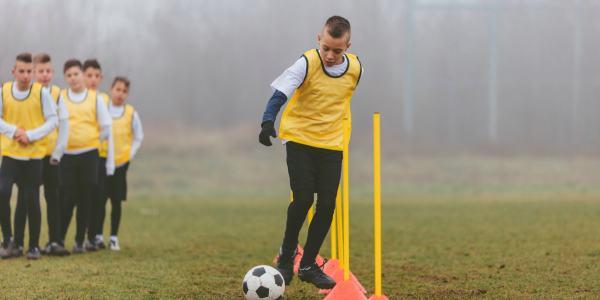Show Your Young Athlete That You Don’t Care About the Win
That’s the word from Wayne LaMarre, clinical professor and director of the athletic training program at the University of New England.
LaMarre is also on staff for the Women’s National Ice Hockey team and was recently a guest on our Ultimate Sports Parent podcast.
For example, elite athletes–like the female hockey players LaMarre works with–worry someone else is going to take their position if they stumble in any way or get injured, he says.
“These athletes are dealing with the constant knowledge that there is someone waiting in the wings to take their place,” he says.
This can cause the players to feel anxious and impacts their ability to form a cohesive team.
If young athletes experience the same type of worries about being replaced, their teams can feel less cohesive, too. It’s important to avoid threatening them with being replaced if they perform poorly in a game.
In professional women’s hockey, athletic trainers like LaMarre try to provide an oasis from anxiety, he says.
“We care about the wins and losses but care more about you—your physical and mental health,” he says.
For sports parents, caring about young athletes also means making sure sports kids don’t overtrain and experience overuse injuries, says LaMarre.
“We see overuse injuries time and time again. We see injuries that could have been avoided had they cross trained,” he says.
Sports parents want to strive to encourage kids to diversify and play more than one sport.
In addition, parents and coaches of girls and young women need to look out for body image challenges that can undermine confidence, says LaMarre.
“You need to help them understand that the perfect body doesn’t exist,” he says. “I see concerns about what they should look like and behave like, especially in terms of what society might think they need to look like versus what feels good to them,” LaMarre says.
Girls might follow Serena Williams, who, with her muscular body, lets people know that it’s okay not to be stick thin.
“It’s great to see athletic bodies that don’t fit into a mold and get the job done on the court or soccer field,” he says.
If you, as sports parents and coaches, show that you care about the individual’s mental and physical health, athletes will feel more confident and hopefully reach out when they’re struggling.
LaMarre often refers the hockey players to psychologists or physicians to ensure they take care of themselves.
Related Articles on Kids’ Mental Game:
- How Toxic Sports Cultures Hurt Kids’ Mental Health
- The Link Between Sports Kids’ Mental Game and Mental Health
- This Pro’s Mental Game Helped Her Overcome Physical Limitations
*Subscribe to The Sports Psychology Podcast on iTunes
*Subscribe to The Sports Psychology Podcast on Spotify
Improve Your Mental Game From Anywhere In The World

We’re certain that, as a parent, you want to help your child develop confidence and discipline in sports and life. And as a sports parent, you’d love for your children to reach their potential in sports. But encouraging your child to strive for greatness without pressuring them can be a challenge.
You can get expert mental coaching with us from anywhere. Meet with us via Zoom, Skype, FaceTime or phone call. With today’s video technology, we are able to connect with athletes and coaches all over the globe.
Call Us Today to Schedule Your Free 15-Minute Session.
Find Out How Your Athlete Can Benefit From One-on-One Mental Coaching

